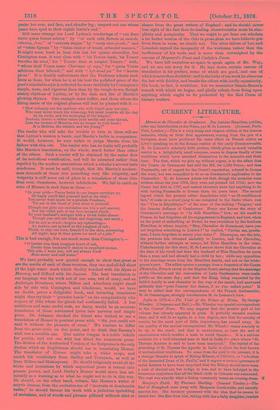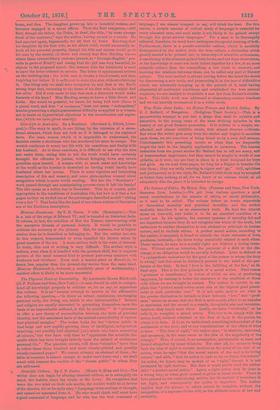marries her. She becomes possessed with the idea that he
means to desert her. She flies from him, taking with her a baby daughWr, reaches home, and dies. The daughter grows up into a beautiful woman, and becomes engaged to a naval officer. Then the Earl reappears,—still Earl, though his father, the Duke, is dead, the title, "by some strange freak of the conferrer," says the author, having passed to a cousin. He had married again, bigamously, for all that he knew. Knowing that his daughter by his first wife, as his eldest child, would necessarily in- herit all his personal property, though his title and estates would go to his sons by the second, (is there any county that Miss Harding knows where these extraordinary customs prevail, as "Borough-English" pre- vails in parts of Kent?) and seeing that the girl was very beautiful, he objects to the proposed match. His interest with the Admiralty is used to have the lover ordered on service. The letter of appointment arrives on the wedding-day ; the bride sees it, breaks a blood-vessel, and dies, forgiving her father. It is sufficient to state this plot, without criticising it. One thing only we shall take exception to, and that is the Earl's strong hope that, returning to the home of his first wife, he might find her alive. Did it ever occur to him that such a discovery would make bastards of his boys ? Miss Harding seems to know a little Greek and Latin. She would be grateful, we know, for being told that iflwx,z is a plural word, and that "st AiXirpipsc" does not mean unforgotten," besides presenting a slight grammatical difficulty as applied to a woman, not to insist on hypercritical objections to the accentuation and aspira- tion (which we have given exactly).



































 Previous page
Previous page